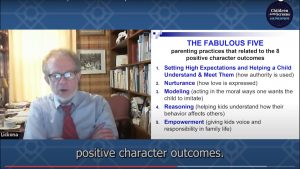
Thomas Lickona, PhD (Professor Emeritus of Education, Director, Center for the Fourth and Fifth Rs (Respect and Responsibility), State University of New York at Cortland), shares his analysis of decades of research that indicates the five most effective parenting practices for developing children’s moral character at #AskTheExperts webinar “The Golden Rule: Cultivating Kindness and Character Online” on June 15, 2022.
[Dr. Thomas Lickona] Now we don’t have to start from scratch with a blank slate. There is good guidance we can get from available parenting research. Here’s a meta analysis of 76 studies carried out by Marvin Berkowitz and his colleague John Rich, looking at studies in the U.S., Canada and the UK. And they identified eight different character outcomes that fell within their broad definition of moral character. You see those on the screen ranging from empathy to self-control. They identified five “super practices,” that they call “The Fabulous Five” – parenting practices that related to at least two, often more, of those eight positive character outcomes. And those are: setting high expectations, helping kids to meet them – that was how authority was used. Nurturance – how love was expressed. Modeling – acting in the ways you want children to imitate. Reasoning – helping kids understand how their behavior affects others, and empowerment – giving children voice and responsibility in family life.
View the Full Webinar

The Golden Rule: Cultivating Kindness and Character Online
How can we help children develop moral character and values such as kindness and compassion online and offline?
Stephen Post, PhD
Director; Professor of Family, Population and Preventive Medicine
Thomas Lickona, PhD
Professor Emeritus of Education; Director
Richard Weissbourd, EdD
Senior Lecturer on Education; Faculty Director
Eva Telzer, PhD
Co-Director; Associate Professor of Psychology and Neuroscience,



